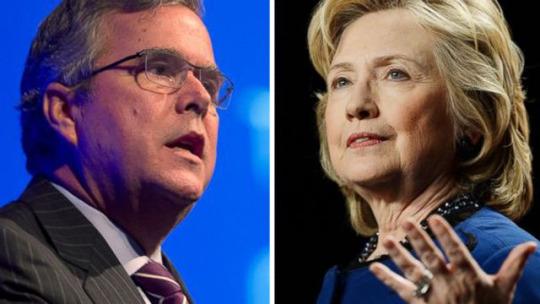
One
week before Jeb Bush jumps into the Republican free-for-all primary on a
debate stage with nine other candidates, he faced off with the likely
Democratic presidential candidate, Hillary Clinton, as the two of them
gave dueling speeches to the National Urban League.
The
highly anticipated showdown between Clinton and Bush, at the Urban
League’s annual conference in Fort Lauderdale, yielded a contrast in
strategies.
Clinton
chose to make an attack on Bush the centerpiece of her speech, but Bush
largely ignored Clinton and focused his remarks on what he did to help
minorities and urban populations during his time as governor of Florida.
Clinton went after Bush aggressively over his recent comments that he wants to “phase out” Medicare. Bush supports making changes to
the current system, such as means-testing benefits, because he believes
it to be fiscally unsound. Clinton and her campaign have seized on
Bush’s words because his comment made it sound like he was talking about
ending the 50-year old health-insurance program for older Americans,
and because Democrats believe the changes he backs will fundamentally
alter its character.
Clinton
singled out Bush by ridiculing one of the central slogans of his
campaign, which is that every American has the “right to rise.”
“I
don’t think you can credibly say that everyone has a ‘right to rise’
and then say you’re for phasing out Medicare or for repealing
Obamacare,” Clinton said. “People can’t rise if they can’t afford health
care.”
Clinton
continued her riff on Bush’s “right to rise” motif and used it to
extend her critique to parts of Bush’s record as governor and her
support for raising the minimum wage.
“They
can’t rise if the minimum wage is too low to live on. They can’t rise
if their governor makes it harder for them to get a college education.
And you cannot seriously talk about the right to rise and support laws
that deny the right to vote,” Clinton said.
A
group supporting Clinton, Correct the Record, quickly followed her
speech with a press release arguing that the “stand your ground” gun law
Bush signed in Florida “disproportionately targeted African-Americans”
and that Bush “pushed discriminatory policing and sentencing laws at
every turn,” “vetoed grants to benefit African-American-owned
businesses,” and created an educational standard called “One Florida”
that “led to a huge drop in African American enrollment at state
universities.”
Bush himself mentioned the “One Florida” program
during a brief back and forth with Urban League president Marc Morial,
acknowledging that the program to end race-based admissions policies in
Florida’s state schools was controversial. But, he said, it actually
increased minority enrollment rates in the state’s schools .
There were 33,000 African-American college students in Florida in 1999, compared to 44,000 in 2013, according to Politifact
. But because Florida’s overall university enrollments have grown at an
even faster pace, the percent of black students has decreased slightly,
from 14 percent to 13 percent. And some in Florida have expressed
concern that the black population at the state’s flagship schools — the
University of Florida and Florida State University — has shrunk as many African-American students have enrolled in smaller regional schools

No comments:
Post a Comment